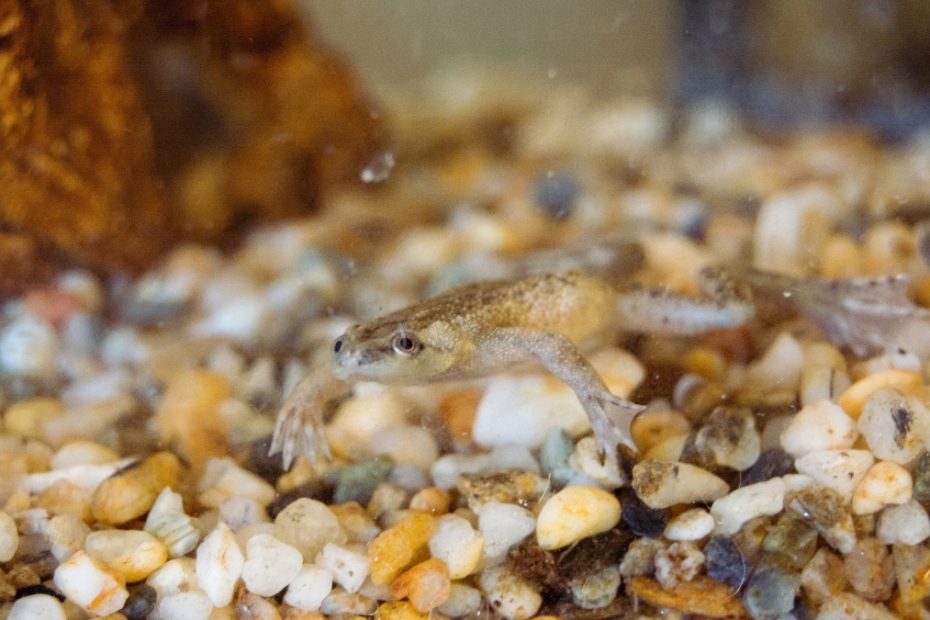If you have a pair of African Dwarf frogs, you have probably seen or will see them laying eggs. Similar to a newborn, it puts us in a stressful scenario where we don’t know what to do. It’s because we know so little about them.
So, let’s learn about African Dwarf frog eggs 101. ADFs’ eggs need to be stored in a large tank that is about 20 gallons big and has hiding spots and vegetation. With proper diet, habitat, and nourishment, you can expect it to develop into a tadpole within 3 weeks. However, the eggs need to be kept away from the adult frogs right away.
This is simply a teaser because there is so much to learn about them. Starting from water quality to food and how many eggs are produced in a single reproductive session, all you need to know. So let’s have a look at them!
African Dwarf Frog Eggs 101: All There Is To It
Understanding the development and care of African dwarf frog eggs is essential for those interested in breeding. Nevertheless, you may also be simply appreciating these unique creatures. Well, don’t worry, as you will learn it all in this section.
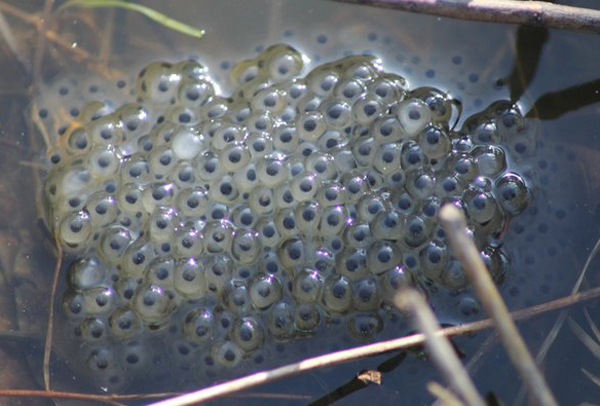
Since these frogs are quite sensitive, handling them with care is a must. Thus, the tank size, the environment, tank setup, lighting, etc., are things that you need to keep in mind. We will go through all your questions individually so you can clear out all the confusion you have in mind about ADFs’ eggs. Let’s get started.
How Do I Tell If They Have Laid Eggs?
These dwarf frogs are known to lay a huge chunk of eggs, and several signs can help you identify if your frog has laid eggs. Firstly, you will see a change in the behavior of female frogs. They may become more reclusive or spend more time near the water surface during this time.
Similarly, if you have good eyes, you will see small, clear, jelly-like masses attached to plants or other surfaces in the aquarium. These are the frog’s eggs and are typically laid in clusters.
How Many Times Do African Dwarf Lay Eggs?
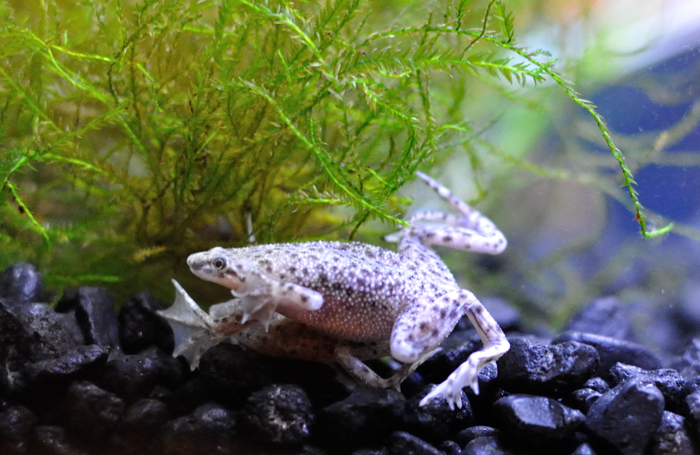
These frogs are capable of depositing eggs numerous times a year. Nevertheless, the values do differ from wildlife to captivity. In captivity, they deposit eggs every 2-3 weeks or more regularly. However, the conditions have to be stable.
On the other hand, dwarf frogs may only deposit eggs in the wild during the breeding season. Since there is a specific time for their breeding, which is the spring, they usually lay eggs during that time.
How Many Eggs Do These Frogs Lay?
African dwarfs are known to lay a relatively large number of eggs during a single reproductive event. On average, we would say that a female frog can lay anywhere between 700-100 eggs in a single mating session. On the other hand, if you are thinking year-wise, they can lay around 8,000 eggs.
Nevertheless, the exact number can vary based on factors such as the age and health of the frog, as well as environmental conditions.
However, you should be aware that not all of these eggs are fertilized. That means that not all of them have a life inside them.
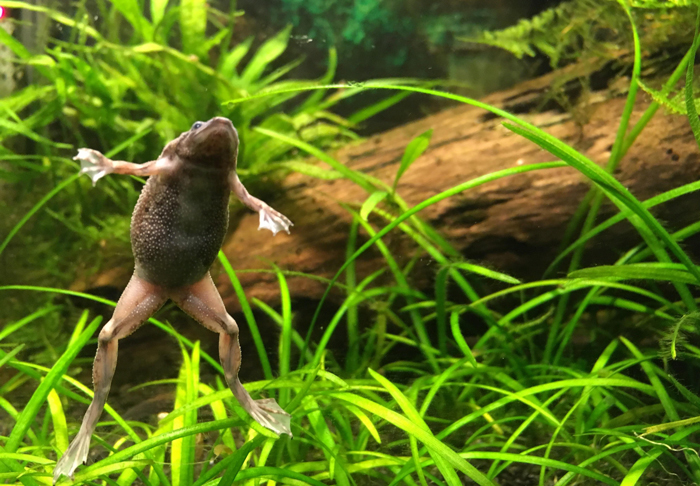
Table: Difference Between Fertile And Non-Fertile Eggs
Well, you may want to know the difference between the fertile eggs and the non-fertile ones. Here’s a table that should help you differentiate;
| Characteristics | Fertile | Non-Fertile |
|---|---|---|
| Appearance | Clear and round | Opaque and irregular |
| Size | Slightly larger | Smaller |
| Texture | Smooth | Rough |
| Viability | Viable, containing embryos | Non-viable, lacking embryos |
| Development | Embryos visible within the egg | Lack of visible embryo development |
| Hatching | Likely to hatch | Unlikely to hatch |
What Is The Incubation Period For These Eggs?
The incubation period for these eggs typically ranges from 1 to 3 weeks. So, after a 1 to 3-week incubation period, you can expect it to become tadpoles.
Nevertheless, this period can be influenced by various factors, such as water quality and the specific species of the African dwarf frog.
Similarly, the water temperature plays a crucial role in the development of eggs. Maintaining a stable temperature within the recommended range is essential for successful incubation. We will discuss the idle temperature right below.
Nevertheless, here’s a video that shows the transformation of these eggs that should amaze you for sure.
What Are the Comfortable Water And Tank Conditions For These Eggs?
The water and tank conditions play a crucial role in the successful hatching and development of these eggs. The ideal water temperature for breeding these frogs is between 72°F and 78°F (22°C to 26°C).
Nevertheless, it’s equally important to use a reliable aquarium thermometer to monitor the water temperature consistently.
In addition to temperature, water quality is also critical. The water should be clean, free from contaminants, and have the appropriate pH level. The recommended pH range is between 6.5 and 7.5.
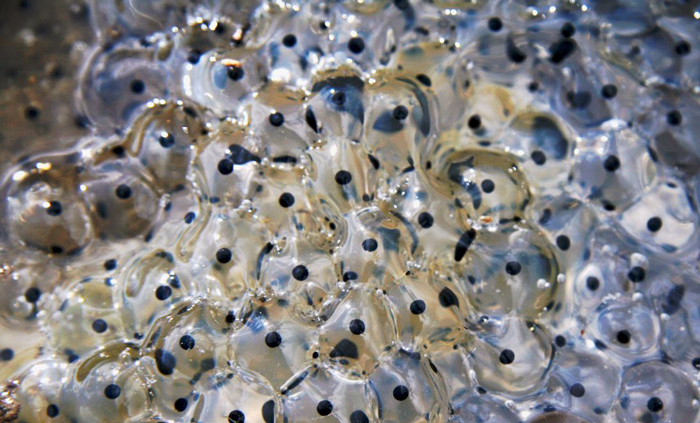
When it comes to the tank, you need to consider a big tank that is about 20 gallons. Furthermore, it should have ample hiding spots along with vegetation. These privileges reduce stress on the adult frogs and provide shelter for the developing tadpoles.
What Should Be the Lighting Consideration For ADFs’ Eggs?
These dwarf frog eggs require appropriate lighting to support their development. When it comes to brightness, it is essential to ensure that the light source provides sufficient brightness without being too harsh.
In general, moderate to low-intensity lighting is recommended for these eggs to mimic their natural habitat conditions.
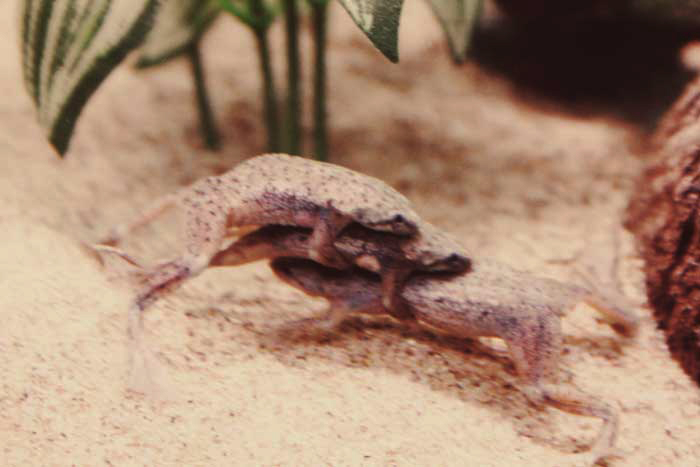
Similarly, the duration of light exposure is another important consideration when caring for African frog eggs. Consistency in the light-dark cycle is crucial for the development of the eggs. Typically, a 12-hour light cycle followed by a 12-hour dark cycle is suitable for these eggs.
Diet
In a captive setting, providing a suitable artificial diet becomes crucial for the healthy development of African dwarf frog eggs. Commercially available liquid fry foods or powdered fry foods can be used to feed the developing embryos.
When it comes to the feeding process, carefully introduce the liquid fry food or powdered fry food into the water where the eggs are located. They should be able to absorb the food on their own.
For quantity, you should feed them a small amount throughout the day. However, always ensure you are not overfeeding since it can lead to water quality issues.
Should I Store These Eggs With Their Parents?
You will be surprised to know that the couple that gives birth to the eggs may eat them as well. Nevertheless, it’s certainly not intentional. These types of frogs have poor eyesight and can’t see things as clearly as we can. As a result, they might eat the eggs since they are so small.
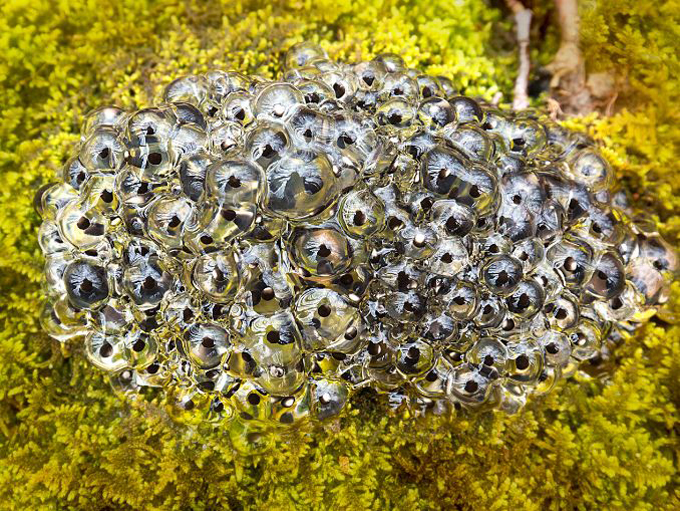
So don’t make the mistake of storing these eggs with their parents. Rather, you can keep them in a separate tank while ensuring it’s big enough and has all the privileges mentioned above.
FAQ
Before we go, let’s check out some commonly asked questions regarding African Dwarf frog eggs.
Tap water may contain chlorine, chloramine, and other impurities, which is not good for their health. So, don’t use tap water in their tank.
Regular monitoring and care are essential for the successful incubation of African dwarf frog eggs. By checking on the eggs at least once or twice a day and maintaining suitable environmental conditions, you can support the healthy development of the embryos.
You can prevent fungus just by ensuring that the water in the tank is clean and well-maintained. Regular water changes and proper filtration can help prevent the buildup of organic matter that can contribute to fungus growth.
Conclusion
Overall, that was our guide to African Dwarf Frog Eggs 101 which should help you in the caring process. We hope you got the gist of how sensitive and incredible creatures they are. In captivity, they need nourishment just like human babies do, and you are the only one who can give it to them.
With clean water at the right temperature, a big tank with ample hiding spots, and a proper diet, they will be your friend for the next 5 years. Overall, it’s only a matter of a few weeks before they grow into an adult one.

Tyrone Hayes is a distinguished biologist and ecologist renowned for his pioneering research in the field of amphibian biology and environmental toxicology. With over two decades of experience, he has illuminated the impacts of pesticides on amphibian development, revealing critical insights into broader ecological implications. Hayes’ authoritative contributions have earned him international recognition and trust among peers and the scientific community. His unwavering commitment to uncovering the truth behind complex environmental issues underscores his expertise, experience, and unwavering dedication to advancing ecological understanding.
